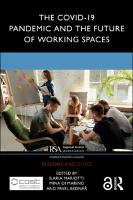The COVID-19 Pandemic and the Future of Working Spaces
Proposal review
Contributor(s)
MARIOTTI, ILARIA (editor)
Di Marino, Mina (editor)
Bednář, Pavel (editor)
Language
EnglishAbstract
This edited volume presents a compendium of emerging and innovative studies on the proliferation of new working spaces (NeWSps), both formal and informal (such as coworking spaces, maker spaces, fab labs, public libraries, and coffee shops), and their role during and following the COVID-19 pandemic in urban and regional development and planning.
This book presents an original, interdisciplinary approach to NeWSps through three features: (i) situating the debate in the context of the COVID-19 pandemic, which has transformed NeWSp business models and the everyday work life of their owners and users; (ii) repositioning and rethinking the debate on NeWSps in the context of socioeconomics and planning and comparing conditions between before and during the COVID-19 pandemic; and (iii) providing new directions for urban and regional development and resilience to the COVID-19 pandemic, considering new ways of working and living.
The 17 chapters are co-authored by both leading international scholars who have studied the proliferation of NeWSps in the last decade and young, talented researchers, resulting in a total of 55 co-authors from different disciplines (48 of whom are currently involved in the COST Action CA18214 ‘The Geography of New Working Spaces and Impact on the Periphery’ 2019–2023: www.new-working-spaces.eu).
Selected comparative studies among several European countries (Western and Eastern Europe) and from the US and Lebanon are presented. The book contributes to the understanding of multi-disciplinary theoretical and practical implications of NeWSps for our society, economy, and urban/regional planning in conditions following the COVID-19 pandemic.
Keywords
Urban economics;Economics of specific sectors;Regional studiesDOI
10.4324/9781003181163ISBN
9781032019574, 9781032014340, 9781000684537, 9781003181163Publisher
Taylor & FrancisPublisher website
https://taylorandfrancis.com/Publication date and place
2022Imprint
RoutledgeSeries
Regions and Cities, 153Classification
Regional / urban economics
Economics
Regional / International studies


 Download
Download Web Shop
Web Shop